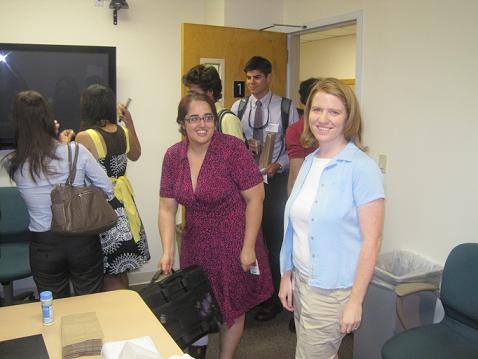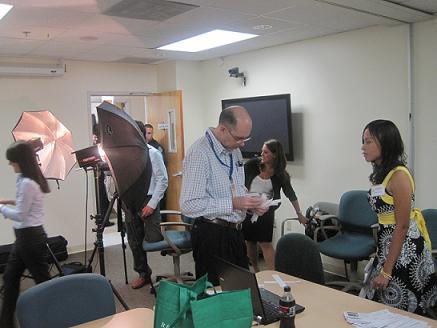Welcome, Class of 2014!
- Details
- Parent Category: Calder Communications Blog
- Category: Come to the Library!
- Hits: 96606
The Calder Library would like to welcome the incoming Class of 2014 to the Miller School of Medicine! 

We enjoyed meeting you all during your orientation activities on Thursday and Friday. We hope that we will see you around the library often and will be able to serve all your research needs. Please make sure to check out our Students Portal, where we have gathered some of your required textbooks and other helpful information. You may also want to check out some of our classes, to brush up on your research skills and learn how to have a Bibliography created automatically for you! Good luck with your first year!
Calder Faculty Member Graduates from Leadership Institute
- Details
- Parent Category: Calder Communications Blog
- Category: Who's Who at Calder: Staff Updates
- Hits: 120125
The Calder Library would like to congratulate library faculty member Tanya Feddern-Bekcan for graduating from the Sunshine State Library Leadership Institute on July 30th.

Read more: Calder Faculty Member Graduates from Leadership Institute
NextBio: an Added Layer to Your Results
- Details
- Parent Category: Calder Communications Blog
- Category: Tips for Researchers
- Hits: 106381
NextBio is a tool which has been added to certain abstracts in ScienceDirect publishing resources. It allows the researcher looking at the article to not only read the abstract of the article but also to see the relevant terms from the article. These terms in turn are searched via NextBio in PubMed, clinical trials, experimental data correlations & studies, and news articles. This will be a way of connecting the immediate research the researcher is looking for (the article), to research the researcher has not thought to look for yet.
PubMed Clinical Queries Page Redesign
- Details
- Parent Category: Calder Communications Blog
- Category: Tips for Clinicians
- Hits: 203027
Are you familiar with PubMed's Clinical Queries? Clinical Queries allows you to search specific, clinical research areas in the medical literature. The Clinical Queries page has been redesigned to make this even easier for you. You can now filter one search by three clinical research areas at the same time: clinical study categories, systematic reviews, and medical genetics. You can also choose another selection from the clinical query drop-down boxes to further modify the results (to see example, click Read More).
Share Your Customized PubMed Settings
- Details
- Parent Category: Calder Communications Blog
- Category: Tips for Researchers
- Hits: 105885
If you have customized your My NCBI account, you can share those settings with your colleagues. Just email them the following link; substitute your My NCBI username for username.
http://www.ncbi.nlm.nih.gov/entrez/query.fcgi?myncbishare=username
The benefit of sharing your My NCBI account link is so your colleagues can run a PubMed search and, depending on your My NCBI settings, can have their search terms highlighted, the Calder full-text icons displayed, specialized filters enabled, and more. After 8 hours of inactivity, those settings will be inactivated; they will need to click on your link again to reactivate those shared settings. Although your colleagues can view your shared settings and run searches with them, they cannot view your saved My NCBI searches, collections, or other personal data. They cannot save the search or send items to a collection without logging into their own My NCBI account. Once they log into their My NCBI account, their settings will override your shared ones.
This is what mine looks like:
http://www.ncbi.nlm.nih.gov/entrez/query.fcgi?myncbishare=tfeddern (click "Read more")
Explore the Redesigned MedlinePlus
- Details
- Parent Category: Calder Communications Blog
- Category: New Resources Announcements
- Hits: 100826
This month the National Library of Medicine released a redesigned version of MedlinePlus and MedlinePlus en español. Here is a video introduction to the newly redesigned MedlinePlus:
Keeping up with the Latest Evidence
- Details
- Parent Category: Calder Communications Blog
- Category: Tips for Researchers
- Hits: 120465
Most databases offer emailed updates or AutoAlerts; this option will send you an email when new articles are published on your topic. The steps below will tell you how to set this up for PubMed, Ovid, and SCOPUS, as well as how to set up journal RSS feeds and alerts.
![]()
From PubMed, log into your My NCBI account, and conduct your Medline search as usual. Once you are satisfied with your search, click on the Save search link, which is above the search box. Give your search a descriptive name and click on the Save button. If you do not have an email address set up, add it. For the question, Would you like e-mail updates of new search results, choose Yes, every day. I suggest leaving the other options as shown, as the Summary format is more concise and PubMed will include a link to all the results if the update included more than 5 articles. Click on the Save button.
Powerful Tool for Demographic Information
- Details
- Parent Category: Calder Communications Blog
- Category: New Resources Announcements
- Hits: 111161
![]()
Are you writing a grant, targeting a healthcare intervention to a specific ethnic group, or wanting to research socioeconomic factors that possibly impact healthcare in Florida? The Florida Electronic Library is offering free access to DemographicsNow. This powerful tool provides Floridian demographic information on race, gender, age, income, housing, education, and more. Access DemographicsNow from the Calder Library’s E-Databases list; click on the letter D.
Mandatory Compliance: My NCBI Replaces eRA Commons for Bibliography Management Effective July 23, 2010
- Details
- Parent Category: Calder Communications Blog
- Category: Tips for Researchers
- Hits: 107528
NIH Access Policy Change – July 23, 2010
(NOT-OD-10-103)
Ever since the NIH Public Access Policy came into effect, Principal Investigators (PI’s) and Program Directors (PDs) have used eRA Commons as a repository of their bibliographies or lists of their authored publications/research. A beneficial and mandatory major change has arrived for Commons users that will provide more efficient and user-friendly ways to maintain and manage the bibliographies of all their authored works (journal articles, manuscripts accepted for publication, books and chapters) and to associate publications with their corresponding grant awards. Users will also benefit from My Bibliography’s ability to populate citation data from PubMed, Pub Med Central, and NIH’s Manuscript Submission System (NIHMSS). An additional benefit allows grant awardees to track compliance with NIH’s Public Access Policy by using an easy and simple color-coded key in My Bibliography.
Pending Interruption in UpToDate Services
- Details
- Written by: David Goolabsingh
- Parent Category: Calder Communications Blog
- Category: Tips for Researchers
- Hits: 101155
There is a pending interruption in services from UpToDate, an online clinical information resource.
UpToDate has levied a 40% increase in subscription fees over the life of the contract. Our current subscription ended June 1st. If we cannot negotiate a reasonable solution, we will lose access to UpToDate. (Please note: UpToDate will still be available at the University of Miami Hospital until October 2010.)
As alternatives, we are asking health practitioners to use DynaMed, Access Medicine, MD Consult, or other evidence-based tools that are available through the Calder Library’s Web page: http://www.https://www.library.miami.edu/calder/index.html (click on E-Databases)
Reference librarians can help you choose among the options.
Get the Credit You Deserve for Publishing! Verify Your Author Record
- Details
- Parent Category: Calder Communications Blog
- Category: Tips for Researchers
- Hits: 102693

The SCOPUS database may be used to evaluate your research productivity, scientific impact, and longevity. Promotion and tenure committees often use data from your SCOPUS profile for evaluating your portfolio because SCOPUS provides:
• Your h-index
• Your average number of citations/article
• Your most frequently cited article
• Your total number of papers
• Your total number of citations
Read more: Get the Credit You Deserve for Publishing! Verify Your Author Record
- Safety Fair at the Miami-Dade Public Library
- Check out our Trial of Mosby's Nursing Consult
- Medical Library Association Conference 2010
- Discover the New Collexis
- Now You Can Take Scopus with You Wherever You Go
- In a pinch? Let the library help!
- Trusted Information on the Gulf Oil Spill
- The Least You Need to Know Series: Isabel
- Postcards from the Health Fairs: Liberty City, Jessie Trice Fair
- The Least You Need to Know Series: SCOPUS
Page 13 of 17
